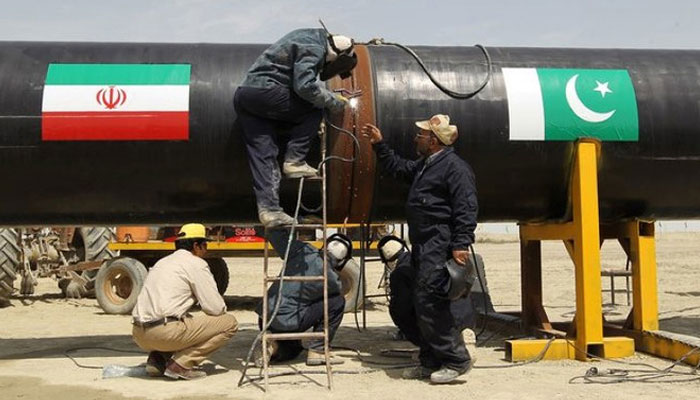Iran-Pakistan gas pipeline strategy being finalised amid US opposition
“The Iranian president may visit after April 20, with tentative dates set for April 22-24
ISLAMABAD: Despite clear opposition from Washington to the Iran-Pakistan (IP) gas pipeline, top authorities from Tehran and Islamabad are set to finalise a strategy for constructing the initial 80-kilometre pipeline from Gwadar to the Iranian border in the first phase, a small segment of the larger 781-kilometre gas line. This will occur during the upcoming visit of Iranian President Ebrahim Raisi.
“The Iranian president may visit after April 20, with tentative dates set for April 22-24. However, diplomats from both countries are in contact to finalise the visit date and agenda for discussions on various crucial issues, including IP gas line, barter trade, counter-terrorism efforts, electricity imports and other matters,” senior officials told The News.
“We have no choice but to lay down the 80-kilometer pipeline from Gwadar to the point where Iran has already laid its portion of the pipeline from the gas field to avoid the $18 billion penalty. If Pakistan manages to extend its contract (gas sales purchase agreement) for importing gas from the Pars gas field in Iran but still fails to implement the project, the penalty amount could escalate to $26 billion from the current $18 billion.” The Gas Sales Purchase Agreement (GSPA) was signed under the French law and disputes between the two countries are to be decided by the Paris-based Arbitration Court. The French arbitration court does not recognise the US sanctions. Iran has extended the deadline for the much-delayed IP gas line project by 180 days until September 2024 and has threatened to move the Paris-based International Arbitration if Islamabad does not respond positively, seeking a penalty of $18 billion.
On February 23, the Cabinet Committee on Energy (CCoE) had approved the recommendations of the Ministerial Oversight Committee for the IP Project, which was established by the prime minister in September 2023. The committee had recommended commencing work on the 80-kilometre segment of the pipeline inside Pakistan, from the Pakistan-Iran border to Gwadar, in the first phase. The project will be executed by Interstate Gas Systems (Pvt) Ltd. and will be funded through the Gas Infrastructure Development Cess. All relevant divisions have given their approval to proceed with the project to ensure gas supplies to the people.
“If the US seeks to halt this project by imposing sanctions, it would need to facilitate the termination of the agreement between Pakistan and Iran in a manner that spares Islamabad from penalties. Additionally, Washington would need to propose an alternative to the IP project that could provide 750 mmcfd of gas if fully implemented.”
Authorities in the Petroleum Division said that the country has no choice but to initiate construction work on the 80-kilometer pipeline from Gwadar to the point where it would connect with the Iranian pipeline already laid in Iranian territory. The project is estimated to cost Rs44 billion. The Petroleum Division will seek a substantial amount for the project in the 2024-25 budget from the Public Sector Development Programme (PSDP), as the Finance Ministry may not be able to release the required amount from the Gas Infrastructure Development Cess (GIDC) fund. The government has collected Rs350 billion from various companies under GIDC, with Rs400 billion yet to be recovered. There are indications from the Finance Ministry that Rs350 billion from GIDC have been utilised for budget financing.
Initially, the country will import 100 mmcfd, which will be utilised in Gwadar. However, if the entire 781-kilometer project is implemented up to Nawabshah in Sindh, Pakistan will import 750 mmcfd of gas.
-
 Nicole Kidman Celebrates Galentine’s Day Months After Keith Urban Split
Nicole Kidman Celebrates Galentine’s Day Months After Keith Urban Split -
 Justin Bieber Unveils Hailey Bieber As First Face Of SKYLRK In Intimate Campaign Debut
Justin Bieber Unveils Hailey Bieber As First Face Of SKYLRK In Intimate Campaign Debut -
 Caitlin O’Connor Says Fiance Joe Manganiello Has Changed Valentine’s Day For Her
Caitlin O’Connor Says Fiance Joe Manganiello Has Changed Valentine’s Day For Her -
 Rachel Zoe Sends Out Message For Womne With Her Post-divorce Diamond Ring
Rachel Zoe Sends Out Message For Womne With Her Post-divorce Diamond Ring -
 James Van Der Beek's Final Conversation With Director Roger Avary Laid Bare: 'We Cried'
James Van Der Beek's Final Conversation With Director Roger Avary Laid Bare: 'We Cried' -
 Jaden Smith Walks Out Of Interview After Kanye West Question At Film Premiere
Jaden Smith Walks Out Of Interview After Kanye West Question At Film Premiere -
 Why Halle Berry Wasn't Ready For Marriage After Van Hunt Popped Question? Source
Why Halle Berry Wasn't Ready For Marriage After Van Hunt Popped Question? Source -
 Michelle Obama Gets Candid About Spontaneous Decision At Piercings Tattoo
Michelle Obama Gets Candid About Spontaneous Decision At Piercings Tattoo -
 Bunnie Xo Shares Raw Confession After Year-long IVF Struggle
Bunnie Xo Shares Raw Confession After Year-long IVF Struggle -
 Brooks Nader Reveals Why She Quit Fillers After Years
Brooks Nader Reveals Why She Quit Fillers After Years -
 Travis Kelce Plays Key Role In Taylor Swift's 'Opalite' Remix
Travis Kelce Plays Key Role In Taylor Swift's 'Opalite' Remix -
 How Jennifer Aniston's 57th Birthday Went With Boyfriend Jim Curtis
How Jennifer Aniston's 57th Birthday Went With Boyfriend Jim Curtis -
 JoJo Siwa Shares Inspiring Words With Young Changemakers
JoJo Siwa Shares Inspiring Words With Young Changemakers -
 James Van Der Beek Loved Ones Breaks Silence After Fundraiser Hits $2.2M
James Van Der Beek Loved Ones Breaks Silence After Fundraiser Hits $2.2M -
 Disney’s $336m 'Snow White' Remake Ends With $170m Box Office Loss: Report
Disney’s $336m 'Snow White' Remake Ends With $170m Box Office Loss: Report -
 Travis Kelce's Mom Donna Kelce Breaks Silence On His Retirement Plans
Travis Kelce's Mom Donna Kelce Breaks Silence On His Retirement Plans




